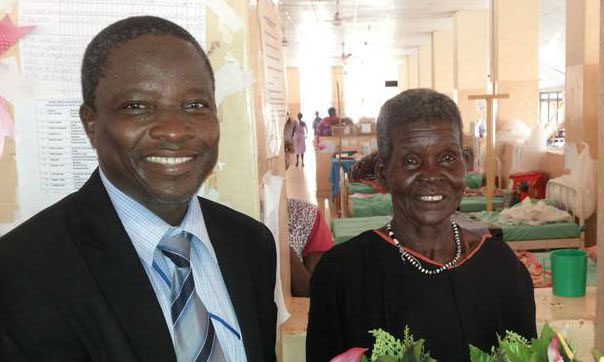News & Updates
Obstetric fistula stories and announcements
Obstetric fistula stories and announcements

Wau, South Sudan – It seemed like the cards were stacked against Regina Awol Deng. She was forced to leave school when she was 7 years old, and to marry when she was just a teenager. She found herself pregnant at 17. And when she developed life-threatening complications, she was far from the nearest hospital with no emergency transport.
Read More
Wau, South Sudan – It seemed like the cards were stacked against Regina Awol Deng. She was forced to leave school when she was 7 years old, and to marry when she was just a teenager. She found herself pregnant at 17. And when she developed life-threatening complications, she was far from the nearest hospital with no emergency transport.
“I was in pain for two days. On the first day there was lots of movement, but on the second day I noticed I could not feel the baby moving inside of me,” she said.
When she finally found a ride to the nearest hospital, it was too late. “When I arrived, they told me my baby was dead,” she said.
Her own life was in danger, as well. Her body was swollen, and she soon fell unconscious. The doctors performed a Caesarean section to save her, but when she woke up, she knew that something was wrong.

Regina Awol Deng, 18, experienced an obstructed labour, a stillbirth and an obstetric fistula. After treatment, she says she wants to return to school. Photo: UNFPA South Sudan/Jaime Jacques
“I couldn’t control myself when I had to urinate,” she said. “When they removed the catheter, I felt urine coming out.”
The prolonged, obstructed labour had left her with an obstetric fistula – a hole in the vagina. This condition can leave women leaking urine or faeces, or both, and typically results in social isolation, depression and deepening poverty.
“Whenever I drink something, I feel pain, and I never know when the urine will come,” Ms. Deng, now 18, told UNFPA.
Long-awaited relief
In July, a group of international surgeons came to Wau for a month-long programme to bring relief to women like Ms. Deng. Part of the Campaign to End Fistula, the programme was run by the Government of South Sudan with support from UNFPA.
The campaign reached out to women over the radio and through UNFPA-supported clinics and midwives. Many women travelled great distances to reach treatment, some of them leaving their villages for the first time.
At the hospital, fistula survivors shared their experiences: All had faced stigma, isolation and depression.
"Wherever I sit, there is a smell all around me, and nobody wants to be around me,” said Hellena Lou Machar, 30, who had been living with fistula since her first pregnancy nine years ago. “My husband doesn’t like it. The smell is embarrassing and I have no control over it.”
When she learned about the programme, she was determined to take part. “I heard that they were fixing people with this problem, and I had to find my way here,” Ms. Machar said.
She and Ms. Deng were among 71 women and girls to receive reparative surgery. The eldest, Akon Kang Ngang, 76, had been living with fistula for nearly 60 years.
Finding long-term solutions
South Sudan has one of the world’s highest maternal mortality rates, and approximately 60,000 women and girls are thought to suffer from fistula. The country’s poor health infrastructure means many women lack access to emergency obstetric care. Child marriage and adolescent pregnancy are other factors.
“The problem here is that forced marriages result in early pregnancies,” said Dr. Said Ahmed, the chief surgeon of the campaign. Girls who are pregnant before their bodies are ready are much more likely to experience fistula."
But the measures required to prevent fistula are well known. Ending the practice of child marriage is critical, both to prevent fistula and to protect girls’ overall well-being. Access to emergency obstetric care – particularly timely access to facilities and health staff able to perform a Caesarean section – must be improved. And family planning programmes must also play a role, as these empower women to space births, helping to improve maternal health.
Empowering women through family planning
Yet family planning is not widely accepted in South Sudan . Many people believe women should have large families to replace the population lost during the country’s recent war.
Health workers in Wau provided family planning counselling to the fistula survivors who had come for treatment, encouraging them to make their own informed choices about future pregnancies. When women feared they would encounter resistance at home, staff offered to reach out on their behalf.
Ms. Deng knew family planning would help her pursue her goals. “I want to go back to school,” she said. “I want to wait two or three years before I get pregnant.”
At her request, health workers counselled her husband on family planning, as well.
The people in the hospital called my husband to talk to him about birth control, and he has agreed to let me use it.”
-Jaime Jacques

DHARAN, Nepal –Dhani Devi Mukhiya remembers the days when her relatives shunned her in public and her husband threatened to bring home another wife. For some of the villagers in her community in Nepal, the obstetric fistula that she lived with for seven years was ‘punishment for a sin’ she had committed in her ‘previous life’.
Read MoreDHARAN, Nepal –Dhani Devi Mukhiya remembers the days when her relatives shunned her in public and her husband threatened to bring home another wife. For some of the villagers in her community in Nepal, the obstetric fistula that she lived with for seven years was ‘punishment for a sin’ she had committed in her ‘previous life’.

In her village in Nepal, Pramila Chaurisiya advocates for women to receive treatment for obstetric fistula. Photo credit: UNFPA Nepal/Santosh Chhetri
I became a soft target for my husband and neighbours at a time when I needed their support the most,” recalls Ms. Dhani Devi, a mother of four children living in eastern Nepal, approximately 660km from the capital city, Kathmandu.
Obstetric fistula is a hole between the vagina and the bladder or rectum. The injury, which leads to incontinence, develops during complications in childbirth, such as prolonged labour without medical intervention. It occurs with higher frequency in adolescent pregnancies. Ms. Dhani Devi, now 29, had her first child when she was 17 years old.

Dhani Devi Mukhiya with her daughter. Ms. Dhani Devi was successfully treated for fistula after seven years. Photo credit: UNFPA Nepal/Anju Shrestha
Child marriage is common in the area, and two women in neighbouring villages went through a similar ordeal. All of them are uneducated, belong to poor families, and have limited access to maternal and family planning services.
A new chance
But the women were able to reclaim their lives after undergoing fistula surgeries through a programme supported by UNFPA, in the region’s only public state-of-the-art hospital to treat fistula, B.P. Koirala Institute of Health Sciences (BPKIHS).
Around 125km southeast of Ms. Dhani Devi’s village, Radhika Rai hopes she, too, will have a new chance at life. Now 20, she was married at age 12 and delivered a stillborn baby at 16, developing an obstetric fistula in the process.

She has just received treatment at the hospital’s ward in the picturesque district of Dharan, after attending a fistula-screening camp organized in the hospital. Radhika Rai recovers from fistula surgery. Photo credit: UNFPA Nepal/Santosh Chhetri
“I tell other married women of my VDC to go to Dharan if they suffer from incontinence from urine or stool,” says the 40 year old, who was married off at 15.
Ranjana Devi Mehata also underwent a successful surgery at BPKIHS and now speaks both for fistula survivors and against child marriage. “Ensuring access to family planning services is not always under our control, but women like me can at least try to convince villagers to delay the marriage of their daughters,” she says.
A 2011 assessment obstetric fistula in Nepal, conducted by the Government of Nepal, UNFPA and the local NGO WOREC, estimated that there are 200 to 400 new cases of obstetric fistula in Nepal each year, leading to some 4,300 cases.

Ranjana Devi Mehata speaks out against child marriage and advocates for fistula survivors. Photo credit: UNFPA Nepal/Santosh Chhetri
It is feared, however, that this is only the tip of the iceberg, as most cases are unreported due the stigma associated with the condition and lack of knowledge about treatment. Obstetric fistula was not officially recognized in Nepal until UNFPA’s Campaign to End Fistula was launched in 2010.
As part of the campaign, UNFPA works with the government and other stakeholders to support prevention and treatment by building the capacity of health institutions and service providers. BPKIHS has recently been designated an obstetric fistula training center.
- Santosh Chhetri

ABUJA, Nigeria – Since her marriage at age 14, Zuera Mustapha, now 21, has experienced two stillbirths and a recurrent obstetric fistula resulting from her difficult deliveries. Yet even with these hardships, she has been luckier than some; her mother and sister both died of complications in childbirth. In northern Nigeria, where she lives, fistula and maternal death are alarmingly common – a fact UNFPA is working to change. fistula after my first delivery. The child had died,” Ms.
Read MoreABUJA, Nigeria – Since her marriage at age 14, Zuera Mustapha, now 21, has experienced two stillbirths and a recurrent obstetric fistula resulting from her difficult deliveries. Yet even with these hardships, she has been luckier than some; her mother and sister both died of complications in childbirth. In northern Nigeria, where she lives, fistula and maternal death are alarmingly common – a fact UNFPA is working to change. fistula after my first delivery. The child had died,” Ms. Mustapha said, simply, from her home area in Kano State.

A fistula rehabilitation centre in Kano, Nigeria. Photo credit: APANEWS
Obstetric fistula is a hole between the birth canal and the bladder or rectum, or both, caused by prolonged labour without prompt medical intervention, such as a Caesarean section. Affected women suffer chronic incontinence, which can result in stigma and social isolation.
Ms. Mustapha received an operation to repair the problem at the Laure Fistula Centre, one of many centres supported by UNFPA in Kano, and she was instructed to have a hospital delivery during her next pregnancy. “The doctors asked me to return to the Murtala Hospital when I was in labour for a Caesarian section. But the labour started in the middle of the night, so I went to the hospital early the following morning,” she said. Despite receiving a C-section, the fistula recurred. The Federal Ministry of Health’s National Strategic Framework for the Elimination of Obstetric Fistula estimates that “approximately 20,000 new cases [occur] each year, although recent studies put estimates at approximately 12,000 new cases per year”. The country has a maternal death ratio of between 487 and 545 deaths per 100,000 live births, according to the strategy.A problem of adolescent pregnancy The problem is exacerbated by adolescent pregnancy. According to a recent United Nations report, “Researchers have found that girls who become pregnant before age 15 in low- and middle-income countries have double the risk of maternal death and obstetric fistula than older women.”
Adolescent pregnancy too often results from child marriage – which is not only a health hazard but a human rights violation as well. “A significant proportion of adolescent pregnancies result from non-consensual sex, and most take place in the context of early marriage,” the UN report says.
According to the 2008 Nigerian Demographic and Health Survey, “Almost half (46 per cent) of women aged 20-49 were married by age 18.”
Taking action
To address the high incidence of obstetric fistula and maternal death, health officials and policymakers must increase access to fistula treatment and promote interventions that can prevent fistula from occurring – routine antenatal care and delivery under the care of a skilled birth attendant such as a doctor, nurse or midwife. Officials must also work to prevent early marriage.
UNFPA provides funding to the Fistula Foundation Kano, which makes treatment of fistula more accessible in Kano and Katsina states; the treatment is usually provided at no cost. The organization supported the treatment of some 685 fistula patients in 2012 alone, and 201 patients were treated between January and September 2013.
Although the UNFPA project targets six local government areas in Kano and Katsina states in northwestern Nigeria, women from other communities have also taken advantage of the facilities.
“We have 60 trained community mobilizers, who go from house to house, educating women on birth preparedness, antenatal care and hospital delivery,” said Musa Isah, the Director of the Fistula Foundation.
“We also now educate men on how best they can support their wives when it comes to pregnancy and child birth, and at the same time encourage delivery in hospitals,” he added.
A ‘Fistula Ambassadors’ programme is also enlisting women to advocate for hospital deliveries, raise awareness of the dangers of early marriage, and inform women and families about the availability of free fistula treatment.
With support from the Federal Ministry of Health, UNFPA has also carried out maternal health programmes in other parts of Nigeria, including in Ebonyi, Abia and Akwa Ibom states. These programmes address obstetric fistula, as well as other issues, such as emergency obstetric care, family planning, early detection of breast and cervical cancers, and girls’ education.

I was 15 years old when I got married, and my husband was 22. My sister-in-law saw me at one of my relative’s wedding and made all the arrangements for her brother to have me,” Sharifa recalls. Forty years later, she describes this as the start of a life derailed by obstetric fistula. Today, Sharifa looks fragile in the way she moves, sits and talks. She is anything but.
Read MoreI was 15 years old when I got married, and my husband was 22. My sister-in-law saw me at one of my relative’s wedding and made all the arrangements for her brother to have me,” Sharifa recalls. Forty years later, she describes this as the start of a life derailed by obstetric fistula. Today, Sharifa looks fragile in the way she moves, sits and talks. She is anything but.

Sharifa (left) at the Malalai Maternity Hospital talking to the doctor that treated her fistula, Dr. Pashtoon Kohistani. Photo credit: Zainab Hiadary/UNFPA Afghanistan - Sharifa (left) at the Malalai Maternity Hospital talking to the doctor that treated her fistula, Dr. Pashtoon Kohistani. (Photo: Zainab Hiadary/UNFPA Afghanistan.
"I delivered my first baby girl 11 months after my wedding, and five years later I had my second daughter,” says Sharifa. “I delivered four more children, but all of them were dead. I still don’t know why. I developed an obstetric fistula delivering the last one."
She does not remember how long she was in labour because she lost consciousness. What she remembers is that after giving birth to her sixth stillborn child, a new nightmare began and lasted 20 years.
“I couldn’t go anywhere,” she says. “There were no Pampers [diapers] before, so I had to use clothes, and I couldn’t visit any relatives or work.
Segregated from family and society
The isolation that Sharifa suffered is just one of the consequences of living with an obstetric fistula, a hole between the vagina and bladder or rectum, usually caused by prolonged labour without treatment. Fistula leaves women leaking urine or faeces, or both, and typically results in social isolation and depression.
Sharifa’s situation is typical of the majority of women suffering from obstetric fistula in Afghanistan. According to a 2011 report conducted by UNFPA, 25 per cent of women living with the condition were younger than 16 when they married. The study, conducted in six provinces, found four cases for every 1,000 women of reproductive age who is or had ever been married.
Afghanistan has one of the highest maternal death rates in the world. The three major killers are hemorrhage, pregnancy-induced hypertension and obstructed labour. Many women who survive childbirth subsequently suffer from injuries such as obstetric fistula.
Sharifa looked for treatment, and received two surgeries, but these proved unsuccessful. Her husband and in-laws decided that he should take a second wife.
“My husband married a second time because I had this problem. No one wanted to eat anything from my hands, so I started to look for a new wife for him,” says Sharifa. “I was the one who introduced her to him".
After her husband married his second wife, Sharifa was left alone to resolve her situation. Eventually, she learned about Malalai Maternity Hospital, in Kabul, the only public health facility in the country that treats obstetric fistula.
When I heard about the programme at Malalai Maternity Hospital, he didn’t want to support me. I had already had two surgeries, so he didn’t think they will cure me.” After asking for her sister’s help, and with financial support from her neighbours and an adopted son, she travelled to Kabul to get her third surgery.
“It’s been four years now since I got my life back,” she says. “Now I can visit my relatives and work.”
A lifeline for fistula patients
Sharifa was treated at the hospital’s obstetric fistula programme, which is funded by UNFPA. She stayed there for 21 days and was one of the first patients treated at the Fistula Ward, where about 100 women now receive surgery every year.

Sharifa's life is forever changed. After suffering from an obstetric fistula for 20 years, she underwent a successful surgery at the Malalai Maternity Hospital in Kabul. Photo credit: Zainab Hiadary/UNFPA Afghanistan
"In 2007, the obstetric fistula programme moved from a treatment-based care approach to one that promotes the prevention of obstetric fistula, its treatment and the reintegration of patients,” explains Mohammad Tahir Ghaznavi, the UNFPA officer in charge of the programme for Afghanistan.
“Through our programme, midwives and obstetricians are trained to prevent, diagnose and refer obstetric fistula patients, and the obstetrician and gynecologist surgeons at Malalai Maternity Hospital are specifically trained to treat them.”
Some of the medical staff at the hospital have also witnessed their share of inoperable cases, or situations in which women with children were abandoned by their families.
Sharifa was lucky enough to have the support of her neighbours, her sister and her adopted son. “Even when she was sick, she was taking care of us,” says her son, Sayed Ahmad, who accompanied her to the hospital. “She is fine now, and we are very happy for her.”
Reported by Maria Blanco Lora

Obstetric fistula entered my life when I was 12 years old.
It was my final year in primary school, and I was embarking on a study of my West African roots when I came upon a story in the Wall Street Journal about a young Tuareg girl in Niger named Anafghat Ayouba.
Read MoreObstetric fistula entered my life when I was 12 years old.
It was my final year in primary school, and I was embarking on a study of my West African roots when I came upon a story in the Wall Street Journal about a young Tuareg girl in Niger named Anafghat Ayouba.
The story began with Anafghat as a pre-teen, around the same age I was. She was married by age 11, had a stillborn child a few years later, and developed obstetric fistula. I was shocked to learn about fistula’s devastating impact on Anafghat, her life and her future. Fortunately, she received treatment.
After recovering, Anafghat returned to her community of Tarbiyat, in western Niger, where she excelled in her studies, became a spokesperson for girls’ education and empowerment, and decided she wanted to become a medical doctor. But suddenly, at the age of 17, she developed complications from her fistula and died.
One moment, Anafghat was alive, vibrant and empowered, and the next she was dead. I was speechless, and in that moment my life changed. Before my knowledge of fistula, I wanted to become a lawyer. But after reading about Anafghat, I aspired to work in medicine with a specialization in women’s health. A simple Caesarean section could have prevented Anafghat’s fistula, but she did not have access to proper maternal care.
I read everything I could find on the topic. And I discovered that it occurred mainly in sub-Saharan Africa, in countries like Chad, Ethiopia, Liberia, Niger, Nigeria, the Republic of Guinea, Sierra Leone, Somalia and Uganda. In Asia, fistula is prevalent in Bangladesh, India, Nepal and Pakistan. A chief underlying factor is the lack of access to healthcare services.
Then I read the book The Hospital by the River, a personal account written by Dr. Catherine Hamlin about her work with fistula patients at the Addis Ababa Hamlin Fistula Hospital. I also read United Nations reports, perused websites and other resources, including the book Cutting for Stone, a novel by Dr. Abraham Verghese. I began speaking to my peers and teachers about the condition. In high school, I wrote about Anafghat for the school newspaper.
In December 2011 and January 2012, my mother, my sister and I traveled to Ethiopia, where we toured the country for a full month, twice visiting the fistula hospital. We saw first-hand the amazing work of Dr. Hamlin, and we spoke with fistula survivors.

At the Addis Ababa Fistula Hospital, January 2012. (Photo: Lamarana Cooper Diallo)
My visit to the hospital personalized my work as a fistula champion. Indeed, it was the affliction that brought me to the hospital. However, upon meeting with the patients—some of whom were my age—I realized that in spite of their state, they, too, held dreams, ambitions and aspirations in the same way I did.
Back in Canada, I felt in my bones that this was my life’s calling. For four years I had been writing and speaking about fistula to all who would listen. My trip to Ethiopia made me realize that I had to be systematic in my efforts.
In March 2012, I established the Women’s Health Organization International (WHOI). A month later, I turned 16. But instead of having the typical ‘sweet 16’ birthday party, I organized a fund-raiser for WHOI. Until then there was no organization in Canada dedicated to bringing about fistula awareness to help in its eradication—I wanted WHOI to be that organization.
As I began doing fistula awareness work, the Canadian community recognized my contributions, and I began to receive invitations tospeak on the issue. I was also recognized with a number of awards, including the ZONTA International Women in Public Affairs Award, and I was named one of Canada’s Top 20 Under 20 leaders.

TEDx Talk: Fistula: The Silent Menace at St. Mary’s University, Halifax, Nova Scotia. October 2011. (Photo: Halifax Grammar School)
Often, women in the Global South are victimized and patronizingly portrayed. I developed The Empowerment Paradigm (TEP) to ensure that the women affected by our initiatives will ultimately become self-empowered by the support we offer. Self-empowerment is a hallmark of WHOI.
I travelled to Sierra Leone and Guinea, where I met with health practitioners who treat fistula patients. In Freetown, I visited the Aberdeen Women’s Centre, which treats, rehabilitates and provides literacy training for women. In Conakry, I met with doctors and programme coordinators from Engender Health Guinea—an NGO that supports fistula treatment sites all across Guinea. I also visited l’Hopital Prefectoral de Dabola in the region of Haute Guinee.
I am grateful to have been given the opportunity to build awareness about fistula among my social, academic, cultural and domesticcommunities. In all of this, however, there is one important person whom I must thank: my mother. She has supported and encouragedmy endeavour since day one, when I learned about Anafghat. She is always there to lend a sympathetic ear to my interest and work in fistula awareness.
WHOI is committed to the fight against obstetric fistula—a dreadful reality that marginalizes 1 million to 2 million women, strips them of their dignity, and worst, denies them their humanity. We are honoured to be a part of the Campaign to End Fistula and hope that this affliction will soon be eradicated.
By Habiba Cooper Diallo

In a rural central Ugandan village, 17-year-old Sulaina sits on the mud floor of the tiny home she shares with her mother and younger brother and sister.
She wants to help provide for her family. But she can't. She can barely leave her house.
Wherever she goes, a sickly smell follows her. That's because she is constantly leaking urine.
Read MoreIn a rural central Ugandan village, 17-year-old Sulaina sits on the mud floor of the tiny home she shares with her mother and younger brother and sister.
She wants to help provide for her family. But she can't. She can barely leave her house.
Wherever she goes, a sickly smell follows her. That's because she is constantly leaking urine.

Sulaina with her family in the village of Serinya. Photo: BBC
The rags she has stuffed in her underwear are drenched quickly, and then the urine starts running down her legs.
She has sores all over her thighs where the urine has burned her.
Sulaina has a condition called obstetric fistula. She developed it after giving birth to a baby girl last year.
Read more
Watch the video

A national campaign has given 211 Malagasy women hope for a normal life. Three hospitals on the country's South-eastern coast participated in the campaign from 19 August to 19 September 2013, providing fistula repairs free of charge.
Read MoreA national campaign has given 211 Malagasy women hope for a normal life. Three hospitals on the country's South-eastern coast participated in the campaign from 19 August to 19 September 2013, providing fistula repairs free of charge.
Organized by the Ministry of Health in partnership with UNFPA, the International Society of Obstetric Fistula Surgeons (ISOFS), the non-profit organization OperationFISTULA and the University of Antananarivo, the effort was part of the global Campaign to End Fistula launched by UNFPA and its partners with the goal of making obstetric fistula as rare in developing countries as it is in the developed world.
Thousands of women and girls live with obstetric fistula in Madagascar. An estimated 2,000 women develop fistula every year in the country.

Women suffering from fistula before the surgery (photo: Guifty Banka/UNFPA)
“For every woman who dies, a family is broken. The surviving children are deprived of the care of their mother. These deaths represent the ultimate failure of maternal and reproductive health services. If the women are lucky enough to survive an obstructed labor, many will still develop debilitating childbirth injuries such as obstetric fistula,” said the UNFPA Representative in the country, Ms. Agathe Lawson.
Patients who benefited from the campaign included 19-year-old Viviane, who lived with fistula for six years before getting treatment. Viviane became pregnant at the age of 13, and although she went to see a doctor during her pregnancy, the childbirth took place at home with the assistance of a traditional birth attendant.
“After being in labour and extreme pain for three days, my parents decided to take me to the hospital. But it was too late, my baby was dead and I had developed a fistula,” Viviane said.
Another beneficiary, 46-year-old Therese, suffered from fistula for 30 years and had her sixth surgery during the campaign. “After the death of my first child, I had four pregnancies more, but all my babies were stillborn… I hope to return to a normal life after this surgery,” she said.

Malagasy surgeon-trainees with campaign organizers: Seth Cochran, founder of OperationFISTULA (third row), Dr. Edwige Ravaomanana, UNFPA Programme Officer for reproductive health (second row, third from left), Glendora Meikle, project director of OperationFISTULA (first row, first from left (Photo: OperationFISTULA)
Supporting the 2013 campaign, the World Food Programme (WFP) handed out meals to the hospitalized women and their families for the whole time they were away from home.
Three surgeons from ISOFS and the Ministry of Health trained nine Malagasy surgeons in fistula repair during the campaign. This 12-strong team of surgeons split over the three hospitals to conducted fistula repairs free of charge. “Every woman with an obstetric fistula is a failure of our health system. Girl-child education and women's empowerment are the most important contributions to prevent obstetric fistula,” said Dr. Thomas Raassen, President of ISOFS, one of the fistula surgery trainers.
Supporting skilled surgeons living in critically under-served areas in Africa and Asia, volunteer-led OperationFISTULA was also involved. "The goal of OperationFISTULA is to empower local surgeons and enable all women with fistula to be treated in a safe and high quality manner. We want to dramatically improve the lives of these women," said Seth Cochran, founder of OperationFISTULA.
Ten hospitals are currently offering fistula surgery in Madagascar, however there is a limited number of health care professionals with the necessary skills. Dr. Mahamat Koyalta, an experienced fistula surgeon from Chad, was among the international surgeons training Malagasy colleagues. He worked with two Malagasy surgeons who he started training two years ago. “The surgeons are excellent. In two or three years’ time, they will be able to train their colleagues,” Dr. Koyalta stressed.
Reported by Guifty Banka

Nearly six months ago, Bridget,* 28, underwent fistula surgery at Queen Elizabeth Central Hospital (QECH) in Blantyre, Malawi, during a repair camp supported by UNFPA and Direct Relief International, which donated surgical supplies. Read full story.
* The real name was changed for privacy purposes.

Access to fistula treatment is a rare privilege for many Cambodian women who live in poor, remote areas and have suffered with this devastating childbirth injury in silence for decades. Now it is possible for them to regain their lives through services supported by UNFPA in partnership with the Children’s Surgical Center (CSC). For the women who endured the condition and their families, it is a blessing to be given back their lives with a renewed sense of hope and confidence.
Read MoreAccess to fistula treatment is a rare privilege for many Cambodian women who live in poor, remote areas and have suffered with this devastating childbirth injury in silence for decades. Now it is possible for them to regain their lives through services supported by UNFPA in partnership with the Children’s Surgical Center (CSC). For the women who endured the condition and their families, it is a blessing to be given back their lives with a renewed sense of hope and confidence.
After years of civil war, Cambodia is still rebuilding its infrastructure. As people struggle for survival, access to information and services remain a challenge, and fistula repairs have not been made available until recently.
In the past, many women had no access to maternal health information or care due to limited resources. Those who lived in rural areas often relied on traditional healers or untrained attendants as their only options.
Cambodian women are often marginalized by society. They have less access to education and public services, and fewer opportunities for employment and political participation. Women are expected to take care of the house, children, sick persons and the elderly -- most often, they do not attend to their own health, tolerating various burdens.
“Besides doing house work I have a very old and sick mother to take care of everyday,” said Met Yorm, 50, who lives in Trapean Veng Khang Lech, a small village about 60 km south of Kampot provincial town. She developed a fistula due to obstructed labour in her 4th pregnancy and suffered with the condition for 20 years.

Met Yorm, 50, sits on a hammock under her wooden house in Trapeang Veng Khang Lech village. The track to the main road wastes away during the rainy season and transportation remains a challenge.
The Children’s Surgical Center started a project to address obstetric fistula and help women in remote locations obtain treatment in a safe facility with international professional standards.
With support from UNFPA and in partnership with CSC, Dr. Claude Dumurgier, a fistula specialist from France, has taught Khmer surgeon Dr. Ou Cheng Ngiep his surgical techniques.
Poorer women living in rural areas, who were unaware of treatment or unable to afford services, can now receive free surgical repair facilitated by the joint-initiative toward ending fistula in Cambodia.
Outside of CSC, private surgeries are often a woman’s only alternative in the country. However, lack of resources for treatment or a simple bus fare for transportation to a clinic are major obstacles that often prevent women from seeking treatment.
Most women who suffer from fistula live in remote areas where roads, transportation, and health services remain a challenge. To add to this, poor women have little knowledge about reproductive health issues such as fistula.

Sah Sin at the CSC’s Chenda Poly Clinic in Phnom Penh learns that she is healed after a successful operation.
ooooo“This is what I lived with after having a baby,” said Sah Sin, 58, when interviewed at the CSC’s Chenda poly-clinic in Phnom Penh, where she underwent a free fistula surgery. “I am so happy to hear that the [urine] leakage is gone,” she added after follow-up visit at the Children’s Surgical Center.
Sah developed a fistula during her first pregnancy, in the early 1970’s, when she gave birth to a stillborn child during the country’s civil war. She was relocated under the new regime to live in a camp, where a traditional birth attendant delivered her baby.
A few weeks after delivery, she realized she was leaking urine uncontrollably. At the time, she was unaware of other women with the same problem and did not know how to manage the situation. Unable to consult with experts, she lived with the life shattering consequences of fistula for over 30 years.ooooo

“I avoided meeting people. I am so depressed to live with this condition.” Tak Eap, ready to undergo surgery at the CSC’s Chenda Poly Clinic in Phnom Penh.
Tak Eap, a 42-year-old fistula survivor from Kampot province, developed the condition in the late 1990s after delivering her first child. She was in labour for two days before her family decided to send her to a hospital. She lost consciousness while being transported from her village and woke the next day in a hospital bed to a stillborn baby and no concrete memory of the delivery process.
A few weeks later, her husband left her after finding out that she was leaking urine. She started to isolate herself from the other villagers because she could not control her bowel movements and could not manage to change her sarong in time.
“It was in 1999. I was in labour for days, then I was sent to a hospital and my baby was stillborn. After, my husband found out that I was leaking and wetting myself. He left me – it was embarrassing [because] my body [smelled],” said Tak.
Barriers
Small family incomes, mainly from farming, go almost entirely to basic needs in Cambodia, giving women less opportunity to seek health care services such as fistula treatment. The CSC outreach team goes out to meet with these women in target provinces to raise awareness and disseminate information about fistula.
“We inform health workers and village chiefs about our upcoming trips and have found that, upon arrival, some of the women are already waiting for us,” said Sam Sitha, Outreach Coordinator for CSC.
Mass media is another effective way to reach patients, especially those living in remote areas where infrastructure is still a challenge. Radio is the most preferred form of communication in rural communities.
“After I heard about fistula on the radio, I talked to my husband and daughter. Then, I [went] to the CSC in Kean Kleang, Phnom Penh," said Sin.
As part of a pilot project started in December 2009, the Children’s Surgical Center targeted four provinces in northeastern Cambodia -- Ratanakiri, Mondulkiri, Preah Vihear and Stung Treng -- where free fistula treatment has already been provided to almost 30 fistula survivors.

Sam Ean and her grandson at home in Paur village, 75 km south of Phnom Penh, after a successful fistula surgery on July 2012.
Sam Ean and her family were in despair and reluctant to seek treatment after the previous attempts to repair her fistula failed. At the beginning, she was so depressed that she locked herself in the house for months.
For 28 years, she tried local healers suggested by friends, relatives and neighbors but found no relief. They all believed that her condition could not be healed. She ended up believing she would have to live with the problem forever.
“I didn’t know where to go for treatment, except seeking help from local healers and the district hospital. But they could not treat it,” said Ean. “I [underwent] two fistula surgeries before coming to CSC in mid-2011. I am so excited and [cannot] express … enough how happy I am now…” said Ean when sharing her experience with her neighbours.
“We are delighted to see that life restoring surgery is now being provided to the long neglected women with obstetric fistula in Cambodia,” commented Gillian Slinger, Campaign to End Fistula coordinator at UNFPA. ”This is a big step forward and perfectly reflects the power of partnerships that underpins the campaign, to ensure help reaches some of the poorest and most marginalized women and girls in the world.”
Reported by Sophanara Pen. Photos: UNFPA Cambodia.

Crown Princess Mary of Denmark, UNFPA patron to promote maternal health around the world, opened the photo exhibition “Lives in Reconstruction” in Beira, Mozambique during her recent goodwill tour to the country.
Read MoreCrown Princess Mary of Denmark, UNFPA patron to promote maternal health around the world, opened the photo exhibition “Lives in Reconstruction” in Beira, Mozambique during her recent goodwill tour to the country.
In her opening statement, Her Royal Highness re-confirmed her commitment to increase awareness of obstetric fistula, a terrible childbirth injury that affects at least 20 women annually for every women who dies in childbirth in Mozambique -- as many as 500 out of every 100,000 live births.

Lucia Muiambo, Mossurize, Mozambique. Photo: Gloria Santos, 2011
“It is my hope that the stories of these fistula survivors will help inform and create greater understanding of what fistula is, and that families, communities and leaders will do their part to prevent new cases in the country,” said Her Royal Highness Crown Princess Mary.
The Crown Princess dedicated the exhibition to the hope of a brighter future for every woman still enduring the devastating consequences of fistula in Mozambique. Prior to the opening, Her Royal Highness also had the opportunity to talk with some of the women treated for obstetric fistula at Beira Central Hospital and listen to their stories.
The opening, hosted by Forum Mulher, a women's network organization in the country, and UNFPA Mozambique, was also attended by The Minister of Corporation and Development of Denmark, Christian Friis Bach, Government representatives, surgeons, fistula survivors, and youth association representatives.
The exhibition, which features 16 rehabilitated fistula survivors from Mossurize District, Manica Province, demonstrates that obstetric fistula can be repaired and that women treated for it can return to their lives.
Their testimonies serve as inspiration for other women still living with the condition, in the hope that they may follow in the footsteps of the women from Mossurize and seek rehabilitation. The exhibition can also help renew the commitment to accelerate efforts to prevent new cases and provide treatment and social reintegration for other fistula victims.
Lucia, 20, is one of the 16 faces portrayed in “Lives in Reconstruction.” She developed obstetric fistula as a result of teenage pregnancy, a prevalent issue in Mozambique. “During the four years I suffered with fistula, I didn’t feel comfortable going to school because of my smell. Now I am eager to learn how to read, write and, hopefully, one day start my own second-hand clothing business at the local market.”
The exhibition “Lives in Reconstruction” was first launched in Maputo last year in the context of the Obstetric Fistula International Working Group meeting, hosted by the Ministry of Health and UNFPA.
Supported by UNFPA, the fistula activities will continue to expand in other provinces of Mozambique as part of the sensitization efforts by Forum Mulher in the area of sexual and reproductive health, with a specific focus on obstetric fistula.
Reported by Helene Christensen, UNFPA Mozambique, with edits by Christine Long and the UNFPA Nordic Office.